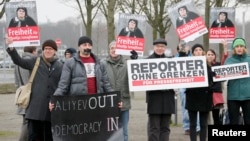The United Nations Security Council unanimously adopted a resolution Wednesday on the protection of journalists in conflict zones.
The measure comes as the number of deaths and kidnappings of media professionals continues to climb. Reporters Without Borders says 66 journalists were killed last year and 25 more have died since January. In the last decade, 700 media workers have been killed in the field or because of their profession.
The Security Council resolution condemns such attacks and warns parties to conflicts, including governments and armed groups, that they should take all reasonable steps to protect journalists.
It also calls for the immediate and unconditional release of reporters who are hostages in conflict zones.
Iraq, Syria are most dangerous
The head of Reporters Without Borders, Christophe Deloire, said Iraq and Syria have become two of the most dangerous places for journalists to work. He said 45 media workers were killed in Syria since that conflict started in 2011 and at least 15 have died in Iraq since 2013.
He said ensuring accountability is key to preventing future attacks.
“In the world, more than 90 percent of crimes against journalists are never prosecuted, are never punished," said Deloire. "It is like an encouragement for all those who commit crimes against journalists. If we want to protect journalists, we have to fight impunity.”
Deloire said attacks on journalists in conflict zones could be considered war crimes and should be referred to the International Criminal Court.
Not just war zones
U.S. Ambassador Samantha Power, herself a former journalist, said even in countries at peace, erosions on press freedoms and the harassment and intimidation of reporters often signal a crackdown on civil, political and human rights.
She gave as an example the current political turmoil in Burundi, where part of the military challenged President Pierre Nkurunziza’s decision to seek what is widely seen as an unconstitutional third term in power.
“Since the unlawful attempt to seize power was quashed, several independent journalists report being told that they are on a list of people to be arrested, and many more reportedly have been threatened with death, torture and disappearance, leading them to go into hiding,” she said.
Power said regimes — like the one of Bashar al-Assad in Syria — and armed groups — such as the self-proclaimed Islamic State — target journalists because they do not want people to see them for what they really are.
As the Security Council met, the Committee to Protect Journalists issued a statement condemning the murder of Brazilian radio reporter Djalma Santos da Conceicao, whose tortured body was found Saturday, one day after he was reported to have been kidnapped by gunmen in the country’s northeast. It was the second murder of a Brazilian journalist in less than a week.




